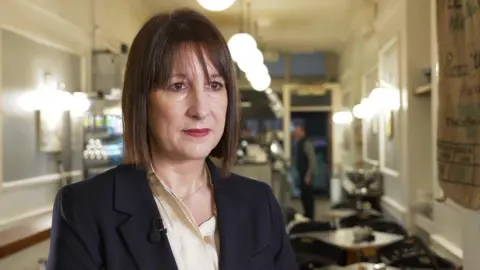 BBC
BBCChancellor Rachel Reeves has defended the decision to reject compensation for women hit by changes to the state pension age after a backlash.
She said “the vast majority” of women knew the changes were coming, and “as Chancellor I have to account for every penny of taxpayers money spent”.
However, some MPs have called for the government to backtrack on the decision, with the Conservatives calling it a “betrayal”.
Campaigners say that 3.6 million women born in the 1950s were not properly informed of the rise in state pension age to bring them into line with men.
“We’re certainly not giving up the fight,” said Debbie de Spon, membership director of the Women Against State Pension Inequality (Waspi) campaign.
The government’s decision comes despite an independent government review recommending the compensation in March.
Rebecca Hilsenrath, head of the Parliamentary and Health Service Ombudsman, which wrote the review, told Times Radio that although the government had accepted that it had delayed writing to 1950s-born women by 28 months, and apologised, it had rejected paying compensation.
“What we don’t expect is for an acknowledgement to be made by a public body that it’s got it wrong but then refuse to make it right for those affected,” she said.
Ms Reeves said she understood that campaigners “feel disappointed by this decision”, but the parliamentary ombudsman had said that “around 90% of women did know that these changes were coming”.
“I didn’t judge that it would be the best use of taxpayers’ money to pay an expensive compensation bill for something that most people knew was happening,” she added.
The government has said compensation could cost up to £10.5bn.
But Ms De Spon said many Waspi women “didn’t know” about the pensions changes, and even to this day women are saying: “I never even received a letter, let alone when I received a letter”.
She added that former Conservative Chancellor George Osborne had saved more than £180bn by raising the state pension age and “boasted that it was easiest money he had ever saved”.
“We’re asking for a tiny fraction of that back as compensation for government failure,” she said.
Conservative shadow business secretary Andrew Griffith said the decision was “a betrayal”.
He said Cabinet ministers “queued up, had their photo taken with Waspi women, talked about how they were going to remedy that injustice.”
“And now they’re perpetrating that injustice not just on Waspi women, but on everybody who has trusted this government, whether it’s businesses, family farmers, or pensioners relying on the winter fuel payment,” he told the BBC.
He said “we won’t know” whether a Conservative government would have paid compensation as they were voted out before making that decision.
The then Conservative-run Department of Work and Pensions told the Parliamentary and Health Service Ombudsman at the time of its report in March why it could not pay out.
It cited “the costs involved, the time it would take, the amount of resource it would involve, and the negative impact delivering a remedy would have on it being able to maintain other services”.
Ms de Spon told the BBC Radio Four Today programme that the government’s decision was “very disappointing” and that many of members of the Labour Cabinet had been “very supportive of Waspi” over the years.
“We think it’s time we called in some of that support,” she said.
What is the Waspi campaign and who is affected?
About 3.6 million women were affected by a 1995 decision to increase the pension age to 65.
The plan was to phase in that change from 2010 to 2020.
But the coalition government of 2010 decided to speed that up.
Under the 2011 Pensions Act, the new qualifying age of 65 for women was brought forward to 2018, which affected 2.6 million women.
The Waspi campaign group has been pushing for compensation because it says the government failed to tell them – or provide adequate notice – about the changes.
It previously suggested some women should receive £10,000 each, at a cost of £36bn.
Nine months ago, the Parliamentary and Health Service Ombudsman recommended compensation of between £1,000 and £2,950 for each of those affected, after a six year investigation.
Ms de Spon said: “It makes rather a mockery of that system if the [government] can cherry-pick which parts of that investigation they choose to accept.”
The Liberal Democrats had earlier said the stance “sets an extremely worrying precedent” in its rejection of the ombudsman’s findings.
Labour MP Brian Leishman said he was “appalled” by the decision.


